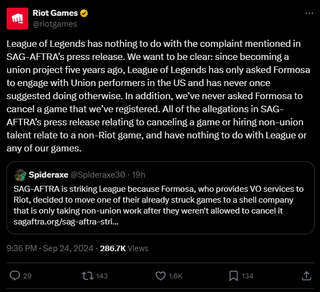As SAG-AFTRA's anti-AI voice actor strike extends to League of Legends, Riot maintains that it's simply been caught in the crossfire
"League of Legends has only asked Formosa to engage with Union performers."

After threatening to do so back in July, SAG-AFTRA, a union that represents over 160,000 professionals across acting and performance disciplines, went ahead with a strike. The strike in question targets AI-generated voice work which, the union claims, requires "fair, reasonable AI protections" to avert a future of talent exploitation, where voice actors aren't cajoled into signing off on allowing companies to use their voice in perpetuity.
In a statement this Tuesday, SAG-AFTRA added League of Legends to the list of videogames under strike: "SAG-AFTRA members must immediately cease providing covered services to League of Legends and the game will be updated on the union’s search function as a struck game."
The League strike isn't quite targeting Riot Games, but rather Formosa Interactive, a production company that works with multiple studios on different games including Helldivers 2, God of War: Ragnarok, Death Stranding, Apex Legends—the list goes on. SAG-AFTRA alleges that Formosa tried to subvert the strike by attempting to "'cancel' one of its struck videogames shortly after the start of SAG-AFTRA’s videogame strike. When they were told that was not possible, they secretly transferred the game to a shell company and sent out casting notices for 'NON-UNION' talent only."
These, the union maintains, are "egregious violations of core tenets of labour law—that employers cannot interfere with performers’ rights to form or join a union and they cannot discriminate against union performers."
Riot took to Twitter to defend its innocence, writing: "League of Legends has nothing to do with the complaint mentioned in SAG-AFTRA’s press release.
"We want to be clear: since becoming a union project five years ago, League of Legends has only asked Formosa to engage with Union performers in the US and has never once suggested doing otherwise. In addition, we’ve never asked Formosa to cancel a game that we’ve registered. All of the allegations in SAG-AFTRA’s press release relating to cancelling a game or hiring non-union talent relate to a non-Riot game, and have nothing to do with League or any of our games."

The actual degree of Riot's innocence, though, is far muddier. As voice actor Linsay Rousseau, who is participating in the strike, writes, "To be fair, @riotgames is a struck company and they've had two months to come to the union and make a deal. But they haven't seemed interested in protecting their actors from AI." Rousseau clarified in a separate tweet, "We encourage @riotgames to sign directly with the union and keep League recording."
The biggest gaming news, reviews and hardware deals
Keep up to date with the most important stories and the best deals, as picked by the PC Gamer team.
As for Formosa? It's denying the allegations up and down: "We fully reject SAG-AFTRA's allegations and have not acted in any manner to undermine employee or union rights, nor our relationship with the union. We believe the strike of League of Legends, a game unrelated to the union's claims, is not appropriate. We stand with the developers, publishers, platform holders, and talent to support global game development in a way that is safe and ethical for all."
It's a little messy—I'm not going to shed tears for Riot as a company, but it has to be frustrating to catch a glancing blow because your vendor allegedly engaged in some sketchy, anti-union nonsense. That might just about be the point on the union's part, though.
If the accusations prove true, then Formosa's shown it's willing to go to lengths to avoid negotiating with SAG-AFTRA. League of Legends isn't at fault for that, but motivating Riot to sign with the union directly (potentially losing Formosa what's bound to be a lucrative client) feels like a solid way to apply leverage.
We'll see if it pans out—maybe we'll see more bizarre justifications pop out of the woodworks, like Amazon Games' CEO claiming that videogames "don't really have acting".

Harvey's history with games started when he first begged his parents for a World of Warcraft subscription aged 12, though he's since been cursed with Final Fantasy 14-brain and a huge crush on G'raha Tia. He made his start as a freelancer, writing for websites like Techradar, The Escapist, Dicebreaker, The Gamer, Into the Spine—and of course, PC Gamer. He'll sink his teeth into anything that looks interesting, though he has a soft spot for RPGs, soulslikes, roguelikes, deckbuilders, MMOs, and weird indie titles. He also plays a shelf load of TTRPGs in his offline time. Don't ask him what his favourite system is, he has too many.
Most Popular






